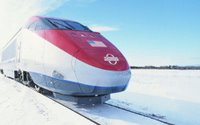It's getting tough to get around.
In December a study
concluded that a national version of London's road pricing programme would be required to deal with the impacts of automobile use.
Then came the
above-inflation increase in rail fares.
This was followed shortly by UK Environment Minister Ian Pearson's
attack on airlines' foot-dragging over emissions caps.
What's a person to do? Let's start with flights.
Air travel is popular because, at 500 miles per hour, you can get from point A to point B quite quickly. And the economics of low-cost airlines can make short-haul travel less expensive than the train.
But it takes a lot of fuel to get an airplane into the air, and back down safely. According to DEFRA, a short-haul flight spends relatively more of its time on takeoff and landing, resulting in emissions of 24 kilograms of CO2 per 100 passenger-miles. At 17.4 kilograms, CO2 emissions per 100 passenger mile are a bit lower on a long-haul flight, because it spends relatively more time at cruising altitude.
How bad is that? Well, it's about the same as the per-mile pollution from driving alone in a passenger car. But it would take a car most of a year to equal the distance covered in just a few hours by jet.
Put another way, you would have to give up driving for six months to make up for the emissions of just one return flight between London and New York. A few flights can easily wipe out all your other efforts to reduce your climate pollution.
The best thing you can do, then, is to think twice before booking your next flight. If you have to fly, you can compensate for it by:
-giving up driving for half a year,
-switching to a green electricity supplier (though you can only use this approach once), or
-investing in carbon saving projects with a
Carbon Clear package.
(Carbon Clear Homepage)


